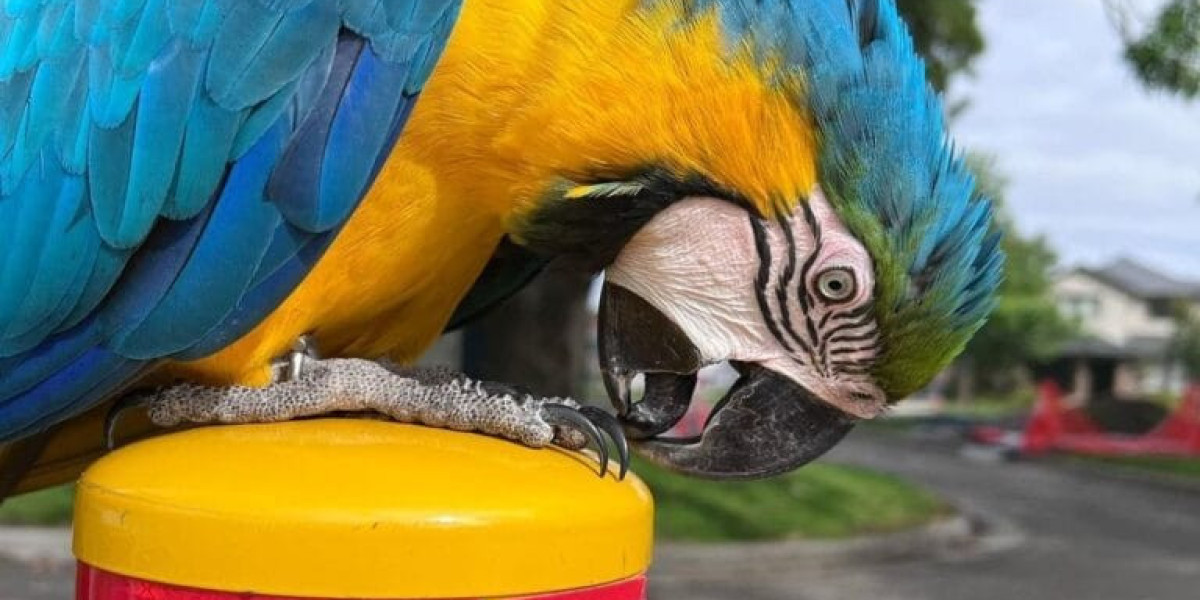 They are easily trained and are rarely aggressive. They are best handled regularly and are able to mimic spoken words.
They are easily trained and are rarely aggressive. They are best handled regularly and are able to mimic spoken words. Macaws are fed pellets fresh fruits and vegetables and seeds. They also require a few wooden perches to climb and chew on.
Macaws are fed pellets fresh fruits and vegetables and seeds. They also require a few wooden perches to climb and chew on.Macaws tend to develop a dominant streak when they first move into a new home. To avoid this, an avian behaviorist and veterinarian should be consulted.
Training
Macaws are intelligent birds that thrive when handled regularly, given stimulation and exercise, and with regular attention. They enjoy playing, exploring their environment and manipulating objects. They will also enjoy being "skritched", or cuddled if they feel at ease with their companion.
Macaws that are not properly handled may become territorial, aggressive or destructive. Those that are bored can be prone to using feathers as a way of self-mutilation. To stop boredom, give plenty of toys that are textured and numerous perches. Playing with toys that simulate preening can also help prevent boredom induced feather destruction. If you observe these behaviors then consult an experienced vet or avian behaviorist.
Young hand - raised macaws are able to adapt to new environments and learning. Introduce them to new people, car trips and hospital visits, as well as other pets (including cats and dogs) and other birds from a young age. They are easily imprinted and require constant care from a young age to prevent them from developing one person bonds. If this happens, parrots often yell for attention and may begin to bite. The ability to lead, discipline and patience are key to changing these behaviors.
As adults, larger macaws like the Blue and Gold, Scarlet, Military, and Hyacinth are more likely to suffer from behavioral issues. Hormonal imbalances, extreme environmental changes, lack of mental stimulation and poor diet can lead to aggression and depression. If left unattended the issues could turn into serious health problems for the parrot, and a difficult situation for the owner.
Mini macaws are easier to train than larger macaws and generally, they can learn tricks, words and basic obedience commands. They do not, however, be as close to their owners. They rarely snuggle close to them or lick their. To build a relationship spend a few hours each day with your bird outside their cage and speak to them in a reassuring tone to help them get used to your voice. Once a bond is built you can help them to hop onto your finger and learn to interact with other people in a secure setting.
Care
Macaws need to interact with their human counterparts. They are intelligent and social birds. They are susceptible to depression and boredom when they are not getting enough time with their friends. If they are not managed properly the macaw that is depressed may self-mutilate itself by pulling out its feathers, which can be extremely dangerous.
To avoid these issues early socialization and education is crucial. It is recommended that a macaw be regularly handled to improve its bond with its owner, promote general health, and allow for an easy examination of the bird's body for injuries or abnormalities. Destruction is another issue that macaws face and owners should ensure that they have plenty of high-quality toys to divert their birds from wooden furniture and other objects that can be lured around the house.
Regularly trim the macaw's nail. This makes it easier to handle the bird, and the nails are less likely to get caught on toys and cages. Short nails also help keep the bird clean and healthy.
Macaws require a large cage that allows them to fly and exercise. A minimum cage size of 3 feet wide, 2.5 feet deep and 6 feet tall is recommended. These large birds should be able spread their wings during flight, and have space for toys, climbing and perching.
It is a great way to enrich your macaw's lives by giving him toys he can use for scavenging, including chewable wood toys, rope toys, puzzles that he can disassemble, as well as mechanical toys. Physical enrichment can be offered by providing a variety branches for your macaw. They can climb them and hide inside them and hide in them.
If your macaw is acting strangely or is breathing openly or gasping for air, or is agitated and unresponsive, it may be trying to lay an egg. The eggs can put pressure on the nerves controlling the legs, which can cause self-mutilation and paralysis. If you notice this behaviour, please contact your veterinarian or an animal emergency clinic.
Feeding
Macaws are omnivores, so they will enjoy eating fruits and vegetables as a part of their diet. They also enjoy eating nuts, pellets and commercial parrot food.
They will need to be provided with various meals on a regular basis to ensure that their diet is well balanced. These little birds eat less than their large counterparts, meaning that owners won't have to make quite as many trips to the pet shop. This could save you money and that's always good thing!
The Hahn's macaw is an excellent speaker, with a loud and short-lived call they use to locate other members of their family. They also make loud, piercing contact calls when they are scared or anxious.
It is a good idea to start your macaw's journey by touching it all over, especially under the wings and behind the head. They are awestruck by being touched and love being admired! Annual exams are a must to ensure that your bird is healthy. This is the best time to check for fecal tests, parasites and other avian health issues.
If you're thinking of buying a macaw, you'll require an enclosure that is at minimum 36" by 24" by 24". This will allow your macaw to stretch and fly around. They must be able exercise their natural energy to remain healthy and content.
The cage should be well-ventilated and have several different perches to provide the bird with choices. By providing the macaw with a way to let off their energy will help them avoid becoming stressed and bored. They are very active in the wild and require to be able to let go of their energy in the comfort of their homes.
A big problem with these little birds is their adolescent hormones. As they age, they can act like teenagers, and can become irritable. This can be difficult for new parrot owners as they learn to live with their bird. The best approach is to be patient and encourage them to maintain their positive behavior.
Health
Macaws are gregarious birds who enjoy playing and bonding with their owners. They are intelligent birds that learn to communicate effectively. They make a great addition to any home and can be a great companion for their 45-to-50-year lifespan. However, they can turn unsocialized if they are not socialized early and can be difficult to handle in the event of abuse or neglect. Training and lots of handling are the key to keeping this animal happy and a great pet for families.
Hahn's miniature macaws provide all of the fun and enjoyment of large macaws, but in a smaller size. They are affectionate and love to cuddle but don't have the tendency to bite or nip as frequently as larger macaws. They are active little acrobats but they can also be peaceful and quiet. They are a great option for those looking to get an macaw, but do not have the space required by larger birds.
The chestnut-fronted macaw is called the severe macaw. It is one of the largest breeds of mini macaw. It is green with blue patches and red on the wings. The head is covered in a chestnut-brown patch with black feathers that cover its eyes. Chestnut-fronted Macaws can be aggressive during puberty. This can lead to issues in captivity. This bird is a great learner and can be a good responder to handling.
Macaws are generally not territorial, but they may become aggressive if their environment is too crowded and stressful. If this happens, it's advised to put the bird in a more isolated room until they calm down. A veterinarian can give your bird a thorough physical examination to assess the health of their ears, eyes as well as their lungs, heart and coelom. A stool sample can be taken to test for parasites.
Birdsville sells a wormer dubbed Worm-Away, which is ideal to worm your macaw. Also, you should change the water in the cage every day and ensure it is filled with enough fresh air. Keep the cage out of direct sunlight, as the heat can overheat the parrot and cause illness.








